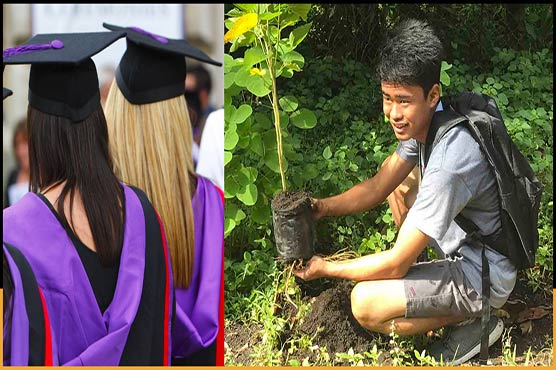Philippines passes law requiring students to plant 10 trees before graduating

The law formalises a tradition of planting trees upon graduation.
(Web Desk) – A new Filipino law requires all graduating high school and college students to plant at least 10 trees each before they can graduate.
The law formalises a tradition of planting trees upon graduation, which is also hoped to simultaneously combat global climate change.
Between 1990 and 2005, the Philippines lost 32.3 percent of its forest cover. Illegal logging has historically been a huge issue for the country, but now the Philippines House of Representatives has put forward a new way of dealing with the problem: a bill that requires students to plant 10 trees each before graduating.
House Bill 8728, or the ‘Graduation Legacy for the Environment Act’, has been proposed by two representatives, Gary Alejano and Strike Revilla. The bill is now to be passed on to the Senate for approval.
"This initiative, if properly implemented, will ensure that at least 175 million new trees would be planted each year. In the course of one generation, no less than 525 billion can be planted under this initiative," Alejano explained in the bill’s explanatory note, as reported by CNN Philippines.
"Even with a survival rate of only 10 percent, this would mean an additional 525 million trees would be available for the youth to enjoy, when they assume the mantle of leadership in the future."
Since 2015, we have actually seen a slight increase in forested area in the Philippines thanks to government initiatives and increased law enforcement tackling the country’s widespread illegal logging.
According to the Global Forest Resources Assessment from the UN Food and Agriculture Organisation, in 2012 alone 221,763 hectares of forest were planted in the Philippines.
The new bill requires all elementary, high school and college students to plant at least 10 trees before graduating. It is unclear if this means a tertiary graduate would have planted 30 trees, or just 10 throughout their schooling.
A number of government agencies will look after the establishment of nurseries, seedling production and site preparation, explains CNN Philippines.
This isn’t the first time such an idea has been put forward by the Philippines government. Back in 2012, a bill in the senate was also filed seeking to make tree planting mandatory, in a very similar way to this new bill.
Although these individual efforts are good, it’s important to note that government regulation of industries that benefit from polluting or deforestation is one of the best ways we can tackle such issues.
Additionally, while planting new trees is always a worthwhile endeavour, old-growth forests contain more value in terms of biodiversity and ecological function, such as the ability of older trees to sequester more carbon than newer trees.
And while Philippines is taking a step forward to tackle its tree problem, it’s as good a time as any to look at our own backyards.
Projections show 3 million hectares of Australian forest are likely to be lost by 2030, and earlier this year US national parks were devastated by patrons after the government shutdown.
Planting millions more trees is definitely something all countries should consider to mitigate some of the deforestation damage already done. But it’s also critical to save the forests we already have.
The country’s Department of Education and the Commission on Higher Education will together implement and ensure compliance with the bill.
The Philippines is one of the world’s most severely deforested countries with total forest cover dropping from 70 per cent to just 20 per cent during the 20th century. Illegal logging remains a problem for the country and the lack of trees in some areas has exacerbated the risk and the impacts of floods and landslides.

